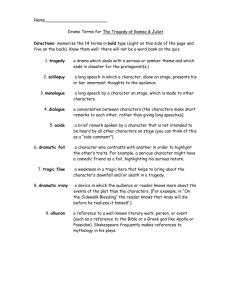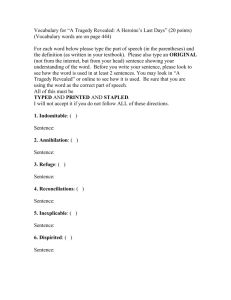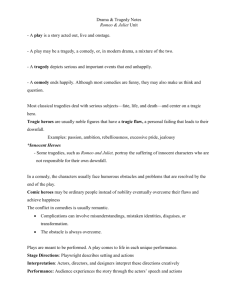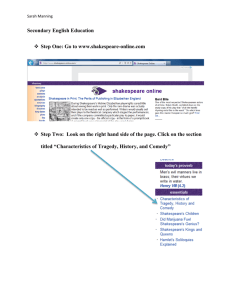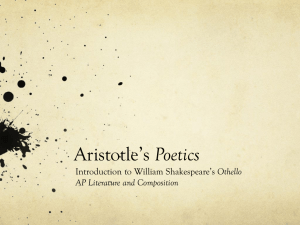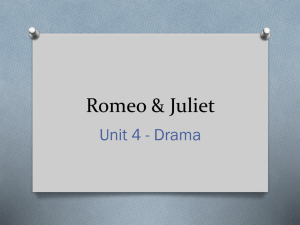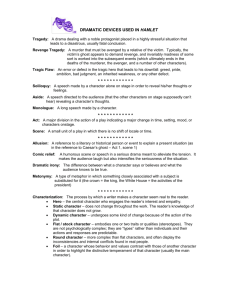LA 3007 Modern Tragic Lives module outline 15-16
advertisement
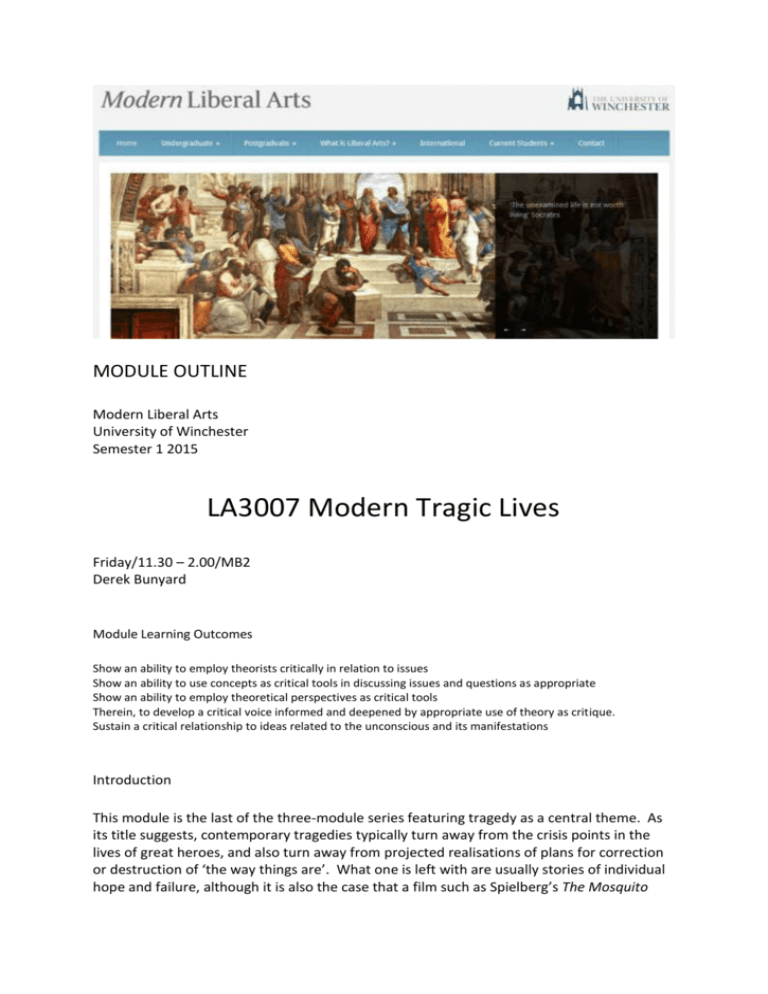
MODULE OUTLINE Modern Liberal Arts University of Winchester Semester 1 2015 LA3007 Modern Tragic Lives Friday/11.30 – 2.00/MB2 Derek Bunyard Module Learning Outcomes Show an ability to employ theorists critically in relation to issues Show an ability to use concepts as critical tools in discussing issues and questions as appropriate Show an ability to employ theoretical perspectives as critical tools Therein, to develop a critical voice informed and deepened by appropriate use of theory as critique. Sustain a critical relationship to ideas related to the unconscious and its manifestations Introduction This module is the last of the three-module series featuring tragedy as a central theme. As its title suggests, contemporary tragedies typically turn away from the crisis points in the lives of great heroes, and also turn away from projected realisations of plans for correction or destruction of ‘the way things are’. What one is left with are usually stories of individual hope and failure, although it is also the case that a film such as Spielberg’s The Mosquito Coast presents the failed life of a dreamer – and a novel such as The Cider-House Rules gives a similar experience of this modern form/perspective on tragedy being used to make larger claims. In this respect, novels such as Birdsong, the Regeneration Trilogy, or the earlier Men at Arms offer good examples of what the modern genera might aspire to – but within this we should also include Ballard’s Crash! and Nabakov’s Lollita. But perhaps plays such as Henry Miller’s Death of a Salesman, or Edward Albee’s Who’s Afraid of Virginia Wolf? are even closer to a modern conception of tragedy, and more recently, the various films directed by Kathyrn Bigelow: The Set-Up, Nearer Dark, Point Break, The Hurt Locker, etc. In general, then, by focusing on the individual and their subjective life, smaller scale events take on much greater significance even though the resulting narrative structure may mirror earlier examples in their implied references, e.g. the adventures of Joyce’s small-time business man, Leopold Bloom, substituting for Homer’s Ulysses, and Molly Bloom substituting for Penelope. In other words, the genre of modern tragedy (which may be no genera at all!) largely follows and reflects the development of sensibilities and techniques that have accompanied the evolution of the novel form since the late Seventeenth Century. But if our principal focus is to become representations of the subject, then what kinds of predicaments are to feature in this subject’s experience that can meaningfully and collectively be called ‘tragic’? As you might expect by now, there is a philosophy here, but also a politics and economics, as well as an ethics of resistance and submission – and particularly, a psychology. What follows does not conform to previous module outlines for this series. Over the last three years instead this module has often been seen by its students as important building block in their preparatory work for their Individual Studies. This has entailed that the majority were already committed to particular fields of study and who therefore had, in most cases, specific interests in the analysis of tragedy. What has emerged as a result of their work and the views they and their peers expressed has been a module that splits its subject into two halves: a first-half that has a set progression of topics – which conveniently focusses on Modernism and a psychoanalytic perspective on subjectivism – and a second half which is very much open to taking its lead from expressed student interests – developed through their presentations, discussions, and contributions that have been selected so as to accompany my own ways of opening up new directions that have affinities with their dissertation interests. That having been said, there is a strong case for starting from two obvious points of departure and one obvious opening – given the module title:1. An initial review of Modernity and Modernism; 2. An initial consideration of what might be a Modern; 3. An initial review of Modern tragedy. (A useful reminder from the second year module on aesthetics: Eagleton, T. (1990) The Ideology of the Aesthetic Oxford: Blackwell; the start of his chapter 3 in particular - the entire book is available at http://www.scribd.com/doc/57870323/Terry-Eagleton-The- Ideology-of-the-Aesthetic - an alternative formulation that ends up locating you in a very similar place, but with more explicit recognition of Kant, Schiller, and Hegel, is in Jacques Ranciere’s book (2013) Aesthetics and its Discontents Cambridge: Polity Press, in the chapter ‘Aesthetics as Politics’, but this text has older and more philosophical antecedents that we can explore if there is sufficient interest.) Lecture/Seminar series Part One: works that seek to establish a Modernist idiom of representation (N.B. this refers to an aesthetic/ideological perspective – Modernism – and not to an historical period – the Modern Age, etc. Week 1. – Lecture: A Theory in Ruins? Theme: what might be ‘rescued’ after Auschwitz? Principal texts referenced: selected reading from Steiner, G. (1971) In BlueBeard’s Castle: some notes towards the re-definition of culture London: faber & faber; Williams, R. (1966) Modern Tragedy London: Chatto & Windus; Part One; Eagleton, T. (2003) Sweet Violence: the idea of the tragic Oxford: Blackwell (both Steiner’s and Williams’ texts are available online). Additional reading: Fenn, R. (2001) Beyond Idols: the shape of a secular society Oxford: Oxford University Press Hardwick, H. & Harrison, S. J. eds. (2013) Classics in the Modern World: a ‘democratic turn’? Oxford: Oxford University Press Kinney, A. (2001) Lies Like Truth: Shakespeare, Macbeth, and the cultural moment Detroit: Wayne State University Press; of interest as an argument for internet-style re-membering of a past cultural moment. Mittelman, A. (2009) Hope in a Democratic Age: religion, politics, and liberal society Oxford: Oxford University Press Week 2. – Lecture: A Modern Tragic Life? Theme: If a modern subject’s experience is predominantly secular and largely personal in its representations of experience, can the scope of any public representation of this still claim a wider ‘tragic’ authority? Principal texts referenced: Franz Kafka (1992) ‘Metamorphosis’ in Metamorphosis and Other Stories London: Penguin Fitzgerald, F. S. (1994) The Great Gatsby London: Penguin DVD Albee, E. (1965) Who’s Afraid of Virginia Woolf? Harmondsworth: Penguin DVD (2006) Warner, Mike Nichols (1966) film of the same title. Also available at http://www.scribd.com/doc/44638239/Who-s-Afraid-of-Virginia-WoolfThe-Full-Text Additional reading: Albee, E. (1962) The Zoo Story and Other Plays London: Cape Bowlby, R. (2007) Freudian Mythologies: Greek tragedy and modern identities Oxford: Oxford University Press Carringer, R. (1996) The Making of Citizen Kane London: University of California Press De Bolla, P. (2009) Aesthetics and the Work of Art: Adorno, Kafka, Richter Basingstoke: Palgrave Macmillan Eilitta, L. (1999) Approaches to Personal identity in Kafka’s Short Fiction: Freud, Darwin, Kierkegaard Helsinki: Suomalainin Tiedeakatemin Mayberry, B. (1989) Theatre of Dissonance: Beckett, Albee, and Pinter London: Fairleigh Dickenson Mulvey, L. (1992) Citizen Kane London: BFI Pavis, P. (1992) Theatre at the Crossroads of Culture trans. L. Kruger London: Routledge Simkin, S. (2005) Early Modern Tragedy and the Cinema of Violence Basingstoke: Palgrave Macmillan Robertson, R. (2004) Kafka: a very short introduction Oxford University Press Roose-Evand, J. (1989) Experimental Theatre: from Stanislavsky to Peter Brook London: Routledge – (viewing of Brook’s Marat Sade highly recommended for discussion purposes). Welsh, A. (2001) Hamlet in His Modern Guises Princeton, N.J.: Princeton University Press DVD Welles – film - Citizen Kane Zischlev, H. (2003) Kafka Goes to the Movies University of Chicago Press Week 3. – Lecture: The Individual and the State Theme: Does modern tragedy demand a specific form of public address? Principal texts referenced: Williams, R. (1966) Modern Tragedy London: Chatto & Windus; chapter 7 – ‘A Rejection of Tragedy: Brecht’; Greene, G. (2004) The End of the Affair London: Vintage DVD (2000) Columbia Tristar, Neil Jordan (1999) film of the same title. PDF: http://mahirbarut.files.wordpress.com/2011/05/greene-graham-the-end-of-the-affair.pdf Additional reading: Beinart, P. (2010) Icarus Syndrome: how American triumph produces American tragedy New York: Harper Brooker, P. (1988) Bertolt Brecht: dialectics, poetry, politics London: Croom Helm Dreiser, T. (2003) An American Tragedy New York: Library of America Frodon, J-M (2010) Cinema and the Shoah: an art confronts the tragedy of the Twentieth Century Albany: State University of New York Press Gardiner, S. (2011) A Perfect Moral Storm: the ethical tragedy of climate change Oxford: Oxford University Press Greene, G. (1990) Brighton Rock London: Penguin + the original film Hammond, P. (2009) The Strangeness of Tragedy Cambridge: Cambridge University Press Marshall, C. (2002) The Shattering of the Self: violence, subjectivity, and early modern texts Baltimore: Johns Hopkins University Press McNamara, R. (1995) In Retrospect: the tragedy and lessons of Vietnam New York: Times Books Nichols, J. (2005) Tragedy and Farce: how the American media sell wars, spin elections, and destroy democracy New York: New Press Pizzato, M. (1998) Edges of Loss: from modern drama to postmodern theory Ann Arbor: University of Michigan Press Reinelt, J. (1996) After Brecht: British epic theatre Ann Arbor: University of Michigan Press Sorley, L. (1999) A Better War: the unexamined victories and final tragedy of America’s last years in Vietnam New York: Harcourt Brace Weisberg, J. (2008) The Bush Tragedy London: Bloomsbury Williams, R. (1966) Communications London: Chatto & Windus Williams, R. (1990) Culture and Society London: Hogarth Press Williams, R. (1991) Drama in Performance Milton Keynes: Open University Press Williams, R. (2001) The Raymond Williams Reader Oxford: Blackwell Week 4. – Lecture: Freud’s ‘Civilisation and its Discontents’ Theme: A single issue presentation with plenty of additional documentation which will be sent to you. Principal text referenced: Freud, S. (1963) Civilisation and its Discontents London: Hogarth Press. (There are more recent versions of this essay available in the library and on the internet.) Additional reading: Bauman, Z. (1997) Postmodernity and its Discontents Cambridge: Polity Press Caygill, H. (1998) Walter Benjamin: the colour of experience London: Routledge De Certeau, M. (1984) The Practice of Everyday Life Berkeley, Calif.: University of California Press Frisby, D. (1985) Fragments of Modernity: theories of Modernity in the works of Simmel, Kracauer, and Benjamin Cambridge: Polity Press Lefebvre, H. (1996) Writings on Cities Oxford: Blackwell Lefebvre, H. (1991) The Production of Space Oxford: Blackwell Grosz, E. (1990) Lacan: a feminist introduction London: Routledge; good introduction to Freud Hird, L. (2006) Hope: and other urban tales Edinburgh: Canongate Kasinitz, P. (1995) Metropolis: centre and symbol of our times Basingstoke: Macmillan Parker, S. (2002) Urban Theory and the Urban experience: encountering the city London: Routledge Sadler, S. (1999) The Situationist City Cambridge, Mass.: MIT Press Stevenson, D. (2003) Cities and Urban Cultures Maidenhead: Open University Press Watson, S. & Bridge, G. eds. (2002) The Blackwell City Reader Oxford: Blackwell Weinstein, D. (1993) Postmodern(ized) Simmel London: Routledge Week 5. – Lecture: Tragic Subjectivity and Its Figuration Theme: Marxism, feminism, other theories of representation – the pertinence of Donna Haraway Principal texts referenced: http://www.egs.edu/faculty/donna-haraway/articles/donna-haraway-a-cyborg-manifesto/ Haraway, D. (1991) Simians, Cyborgs and Women: the reinvention of nature London: Free Association Haraway, D. (1997) Modest_witness@second_millennium: ; femalehuman_meets_oncomouse: feminism and technoscience London: Routledge. There is also one of my own articles that I will provide you with entitled ‘Sticky Fingers’, which was published in the Reconceptualising Early Childhood journal some years ago. (If you have not yet come across Donna Haraway, I will be introducing her, and her cyborgs. The first version of her essay was written in the 1980s before the Terminator film series and Hollywood’s take-over of this figuration. AI’s David may be more helpful, but not all that much; I would far rather that you use Shelley’s representation of Frankenstein’s monster: remove the gothic elements and you reach the outskirts of Haraway’s own arguments. Subsequently, Haraway developed the substitute image of the coyote, but she can explain these ideas for herself. (It’s also worth noting for the second half of the module that if you simply put Haraway in our library’s search-field, after the ones given above, it throws up collections under the titles of incorporations, posthumanism, cyberculture, etc.) Here is a selection of websites students have found useful in the past: http://www.metamute.org/editorial/articles/whatever-happened-to-cyborg-manifesto http://www.english.upenn.edu/~jenglish/Courses/keen2.html http://www.stumptuous.com/comps/cyborg.html http://www.wired.com/wired/archive/5.02/ffharaway_pr.html http://www.lynnrandolph.com/ModestWitness.html http://muse.jhu.edu/journals/con/summary/v009/9.1bartsch.html http://www.departmentofbiologicalflow.net/snowboarding-and-strategies-of-refusalgoddess-cyborg-switch/ (!?) Additional reading: Basterra, G. (2004) Seductions of fate: tragic subjectivity, ethics, politics Basingstoke: Palgrave Macmillan Gordon, P. (2001) Tragedy after Nietzsche: rapturous superabundance Urbana, Illinois: University of Illinois Press Macpherson, S. (2010) Harm’s Way: tragic responsibility and the novel form Baltimore: Johns Hopkins University Press Nancy, J-L. (2000) Being Singular Plural Stanford, Calif.: University of Stanford Press Pickstock, C. (2013) Repetition and Identity Oxford: Oxford University Press Trilling, L. (2008) The Liberal Imagination: essays on literature and culture New York: New York Review of Books Week 7. – date of submission for the first assignment. I will be available for discussion, etc. related to the assignment from Monday of this week onwards, and I will also be in the seminar room on the Friday from 10.00 to conduct a review for those wanting any lastminute comments. What follows are those titles for which I will be providing thematic introductions. If aspects of these match your dissertation interests, or there are other titles that you would like to sponsor (actively!), then please contact me at least a fortnight in advance so that the programme can be adjusted and other students notified. Week 8. – Tragic Therapies Week 9. – Tragic Groups and Institutions Week 10. – Tragic Objects Week 11. – Tragic Spaces and Times Week 12. – Review point: Tragic Subjectivities – principal reference point Thomas Mann’s Death in Venice – if you have not yet read this I suggest viewing the Visconti film of the same title. Sources for this: http://en.wikipedia.org/wiki/Death_in_Venice http://www.scribd.com/doc/985179/Death-in-Venice http://en.wikipedia.org/wiki/Death_in_Venice_(film) http://www.imdb.com/title/tt0067445/ http://www.youtube.com/watch?v=X4N8B1ggYc4 Assessment 1: (50%) …. (2250-2500 words; deadline: (Friday, week 7) given to Catherine in the Office by 3.30pm). Assignment 1: Can tragedy be Modernist, as opposed to Modern? Assessment 2: (50%) ….. (2250-2500 words; deadline (week 1, Semester 2) given to Catherine in the Office by 3.30pm). Assignment 2: You are encouraged to negotiate a title that can be directly related to your preparation work for the Individual Study. Alternatively there are two options:A) In contemporary Britain can tragedy be therapeutic? B) In what sense, if any, was Banksy’s recent installation, Dismaland, tragic, rather than bathetic? Use Harvard Referencing We attempt always to return work within 3 working weeks (15 days working days). MODERN LIBERAL ARTS MARK SCHEME We want you to be very clear about how we will mark your work and that means you must know with each assessment what you are expected to do. We hope that this does not mean you will feel that you have to write to a formula. We are trying to build in considerable freedom to your assessments; but as the term ‘liberal arts’ conveys, in every freedom there is a discipline, and in every discipline there is a freedom; together, we hope, they constitute the struggle of learning. There are (often but not always) two types of essays in MLA: the first assessment title in a module will most often be set by the tutor and will be restricted to texts explored in the first weeks. The second assessment title can be tutor-led, or chosen from a list of titles, or can be negotiated individually; this varies according to the tutor and the module. This assignment can explore wider issues, employ wider reading, or explore a single issue in depth. Students will bear some responsibility for the references consulted in the second essay, increasing through years 1, 2 and 3. Tutor-set assessments (disciplina) Student/tutor-set assessments (libertas) 1st module essay 2nd module essay Marks for depth of understanding specialist terminology depth of understanding of set texts depth of understanding of ideas/concepts evidence by quotation answering the question correct referencing word limit Marks for depth of understanding of texts depth of understanding and application of ideas/concepts evidence-based critical arguments depth/breadth of reading (depending on the question) answering your own question correct referencing word limit Note the difference between essays 1 and 2: the first one is marked only on your understanding of texts; the second one is marked on understanding, on your own reading, and your emerging critical voice. Be careful here; being critical does not mean just giving your opinions. It means making a case based on evidence from your reading, using ideas and concepts from texts. It does not mean you have to fight for one side of an argument or another… ambivalence will be treated with great respect. But for every essay, remember this: if we (and you) get the title right, then by answering the question you will be doing exactly what is required. Over years 1, 2 and 3 the levels of your work are raised by using increasingly challenging texts, ideas, concepts and writers, and by the way you are able to employ ideas, concepts and writers from other modules across the degree in increasingly sophisticated ways. For all essays, then Depending on the question you will need to Demonstrate reflection on module material and the wider contexts from across the degree which might impact upon it Communicate experiences of texts and ideas as appropriate Show knowledge and understanding of specialist terminology Demonstrate requisite research skills in gathering, summarizing and presenting evidence including proficiency in referencing and academic conventions. For essay 1 Depending on the question you will need to Show careful reading of primary sources Show a knowledge of theoretical perspectives and/or works Show an understanding of abstract concepts and ideas within theoretical perspectives Show an ability to work with theorists and their concepts in various forms of assessment as appropriate Show evidence of engagement with texts and ideas concerned with issues raised in the module. For essay 2 Depending on the question you will need to Show an ability to employ theorists critically in relation to issues Show an ability to use concepts as critical tools in discussing issues and questions as appropriate Show an ability to employ theoretical perspectives as critical tools Therein, to develop a critical voice informed and deepened by appropriate use of theory as critique. Sustain a critical relationship to ideas related to the module It is often hard to explain in generic terms how any particular essay could have been improved. But, cautiously, we can say the following: In general, a 3rd (40-49%) may have ignored the question, may have not given much evidence of reading, may have clumsy sentence structure, but will still have made a bona fide attempt at the work. a 2.2 (50-59%) will have provided evidence of reading, quotations where appropriate, clear sentence structure, attended to the question or title, but not related the material in ways which synthesise more developed and complex thinking. a 2.1 (60-69%) will have evidence of reading through effective selection of quotation, being able to make specific points, and to relate material together to make broader and/or deeper and more complex observations. At the higher end, it may have been able to relate material from across modules, or across the degree as a whole, to synthesise separate ideas and issues into more holistic comments, ideas and problems. The questions addressed will be getting ever more difficult and important, including those that are asked without being answered. a 1st (70-100%) will make a little go a long way. Quotations may carry implications beyond their precise content; sentences will be clear but able to refine complex ideas succinctly; most importantly, it will be able to combine the microcosm of its subject matter with the macrocosm of its place in the wider context, and these contexts will be drawn form the overall, experience of the degree, growing obviously from years 1 to 3. No inaccuracies of grammar or sentence construction, and no referencing mistakes are expected here. The voice of the essay will be in control of difficult material throughout. Above all the questions asked and addressed will be compelling in their difficulty and import. Module Evaluations (previous year) Catalogue summary This module completes the trajectory of modules that have followed the perception of tragedy from the earliest records of public art; in this module the focus turns upon the Modern. As with the level 5 module, ideological analysis offers a starting point, but rather than this being considered at the level of the state, it now focuses on the individual subject and this subject’s hopes and despairs. The opportunity is therefore taken to consider psychoanalytic accounts of the vicissitudes of the subject, but two further dimensions of analysis are also included: a review of the forms of representational strategy that have become appropriate with the development of electronic media, and a retrospective study of the contemporary place of myth and the heroic, and of the utopian/dystopian distinction under modernity.
